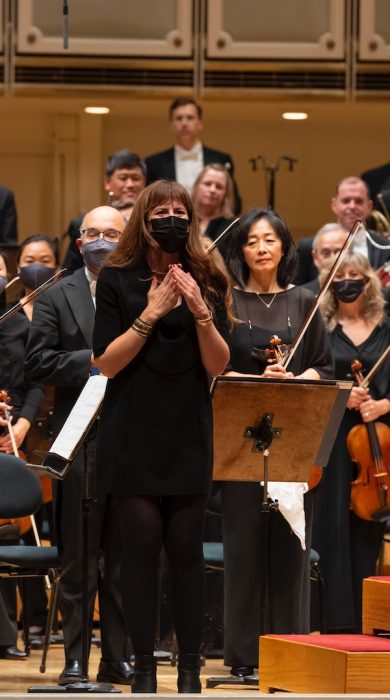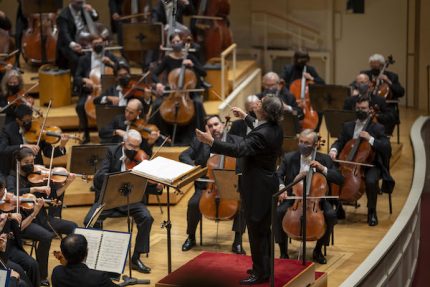A pair of farewells in CSO program of Mazzoli and Tchaikovsky

Among the multitude of musical plans upended by Covid-19 was the second half of Missy Mazzoli’s three-year tenure as composer in residence of the Chicago Symphony Orchestra.
Still, even with the hardships forced by pandemic cancellations, Mazzoli’s achievements over her term in Chicago were many and laudable. From her first MusicNOW program to her last, she significantly broadened the range of composers and repertoire as curator of the CSO’s new music series. Along with CSO staff she effectively moved the series online during the pandemic, creating a series of rewarding streamed concerts. (That included the local premiere of her Dark with Excessive Bright, one of the finest double-bass concertos to appear in decades.)
Three years after the start of her residency and four months after it ended, Mazzoli’s music finally made its belated debut on CSO subscription concerts, with Riccardo Muti leading a performance of These Worlds In Us Thursday night at Symphony Center. The event amounted to the first installment of a two-part CSO farewell to Mazzoli. The premiere of her long-delayed CSO commission Orpheus Undone will take place next spring.
Dedicated to her father, a Vietnam veteran, These Worlds In Us was written in 2006 and was not only one of Mazzoli’s earliest compositions but her first piece for orchestra. The title is take from James Tate’s poem, “The Lost Pilot” and while there is no specific program, the work reflects her belief that “music can reflect painful and blissful sentiments in a single note or gesture.”
A discordant chord leads off, the percussionists playing melodicas (mouth organs) that lend a wheezy antiquated timbre “like a broken accordion.” There is a raft of intriguing material packed into these nine minutes yet the overall impression is of a sensitive protagonist, as depicted in the violins’ initial theme, continually met by hostile forces, often with a malign militaristic feel.
There are passages of Mazzoli’s restless surging and pointillist lyricism—tonal and in the plaintive Barber-American tradition, albeit through a refracted mirror. Violins drop abruptly into glissandos and there are acerbic high trumpet fragments and the ominous tread of electronic drumbeats. The music surges and accelerates in Mazzoli’s shape-shifty style, as a chugging proto-minimalist riff segues into rat-a-tat percussion tattoos before swirling back to a quiet ending and return to the opening material.
It’s astonishing that this was Mazzoli’s debut piece for orchestra, such is the bold confidence, quirky individuality and scoring ingenuity—all unified successfully and presenting, in the composer’s words “something completely new and strangely familiar”—words that could describe nearly all her excellent music since as well.
Muti led a soaring, surging performance that made all of Mazzoli’s singular effects and coloring come across in bold relief. The composer was on hand to take a bow and share in the enthusiastic and prolonged applause for her music.
Mazzoli is one of the finest and most consistent composers of our time and one looks forward to the long-belated CSO premiere of Orpheus Undone in spring as well as Lyric Opera’s presentation of her chamber opera Proving Up in January. Let’s hope that some enterprising company gives us Mazzoli’s opera Breaking the Waves, based on the Lars von Trier film, as well.
Another farewell—this one more permanent— was the main work of the short program with Tchaikovsky’s Symphony No. 6.
The “Pathetique” is one of those works weighed down by its own backstory. Three days after Tchaikovsky conducted the premiere of what would be his final piece, the composer casually drank a glass of unboiled water in the midst of a teeming cholera epidemic and died four days later. As if the Sixth is not gloomy enough.

Muti led a performance that had many virtues. Keith Buncke managed to make the lugubrious opening bassoon solo unsettling in a fresh way. Every solo appearance by clarinetist Stephen Williamson seemed like a seminar in febrile Russian melancholy. Climaxes were put across with daunting power and the loudest volume heard in Orchestra Hall in two years.
Yet while there were compelling moments, this “Pathetique” didn’t quite gel into an effective whole. In the first movement, the conductor kept a tight rein on the famous yearning second theme, here lean and unsugared. But climaxes were miles over the top with metallic tuttis and blaring, raucous brass that brought back memories of Georg Solti at his most frenetic.
Muti took an individual approach to the inside movements. The faster pace in the second movement added greater tension and edge but sacrificed the lilting charm that is essential for contrast. Conversely, the famous march was kept at a slower pace and heavier tread than usual. That made the theme seem not so much music of frantic desperation but almost comically jaunty (though not playing it for speed and excitement largely eliminated the premature applause at the coda).
The finale was effective enough but stayed almost entirely on the surface communicating little of the heartbreak or despair that inhabits this tragic music with the final descent to oblivion unmoving. Muti’s attention to dynamics—here and throughout—was uncharacteristically casual—climaxes were punched up way above the score and the basses’ final notes were nowhere near the edge-of-audibility pppp as marked.
Despite superb individual contributions, the concert didn’t eliminate memories of the last Tchaikovsky Sixth on this stage three years ago when Michael Tilson Thomas led a “Pathetique” that was wrenching and revelatory.
It was the creative indolence of Anatoly Liadov that led Sergei Diaghilev to fire him for missing his deadline for the impresario’s new ballet. With little time to spare, Diaghilev took a chance on a young and promising replacement—the composer was Igor Stravinsky, the ballet was The Firebird and the rest is musical history.
Liadov’s output was small but exquisitely well-crafted as with The Enchanted Lake, which was the evening’s centerpiece. Muti had the full measure of Liadov’s picturesque miniature, leading an elegant performance that brought out the shimmering moonlit qualities without overdoing the sentiment.
The program will be repeated 1:30 p.m. Friday and 8 p.m. Saturday. cso.org.
Posted in Uncategorized

